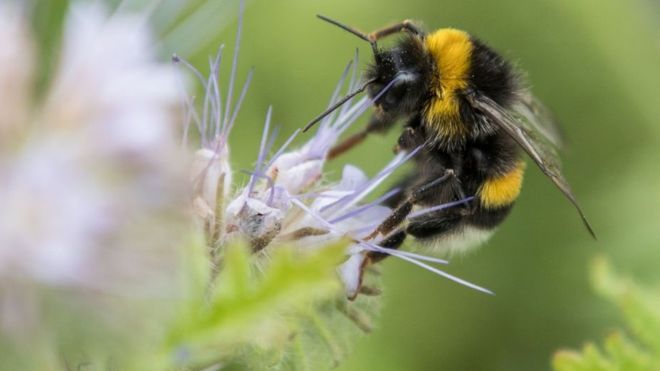
Climate change: Loss of bumblebees driven by ‘climate chaos’
- "Climate chaos" has caused widespread losses of bumblebees across continents, according to scientists.
“Climate chaos” has caused widespread losses of bumblebees across continents, according to scientists.
A new analysis shows the likelihood of a bee being found in any given place in Europe and North America has declined by a third since the 1970s.
Climbing temperatures will increasingly cause declines, which are already more severe than previously thought, said researchers.
Bumblebees are key pollinators of many fruits, vegetables and wild plants.
Without them, some crops could fail, reducing food for humans and countless other species.
Dr Tim Newbold of University College London (UCL) said there had been some previous research showing that bumblebee distributions are moving northwards in Europe and North America, “as you’d expect with climate change”.
He added: “But this was the first time that we have been able to really tie local extinctions and colonisations of bumble bees to climate change, showing a really clear fingerprint of climate change in the declines that we’ve seen.”
Bumblebee declines are already more severe than previously thought, said lead researcher Peter Soroye of the University of Ottawa in Canada. “We’ve linked this to climate change – and more specifically to the extreme temperatures and the climate chaos that climate change is producing,” he said.
Bumblebees are among the most important plant pollinators. Declines in range and abundance have been documented from a range of causes, including pesticides, disease and habitat loss.
In the new study, researchers looked at more than half a million records of 66 bumblebee species from 1901 to 1974 and from 2000 to 2014.
They found bumblebee populations declined rapidly between 2000-2014: the likelihood of a site being occupied by bumblebees dropped by an average of over 30% compared with 1901-1974.
‘Alarming’ losses
Bees have been hardest hit in southern regions such as Spain and Mexico due to more frequent extreme warm years. And, while populations have expanded into cooler northern regions, this has not been enough to compensate for the losses.
Jonathan Bridle and Alexandra van Rensburg of the University of Bristol described the findings as “alarming”. Commenting in the journal Science, they said: “The new study adds to a growing body of evidence for alarming, widespread losses of biodiversity and for rates of global change that now exceed the critical limits of ecosystem resilience.”
There are around 250 species of bumblebee in the world. According to the International Union for Conservation of Nature (IUCN), declines have been documented in Europe, North America, South America, and Asia, caused by a variety of threats that range from habitat loss and degradation to diseases and pesticide use.



